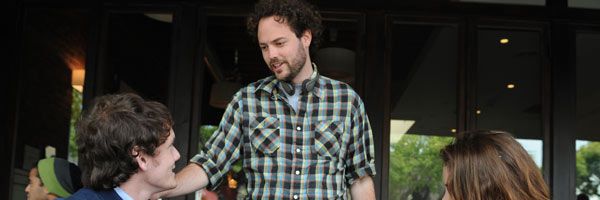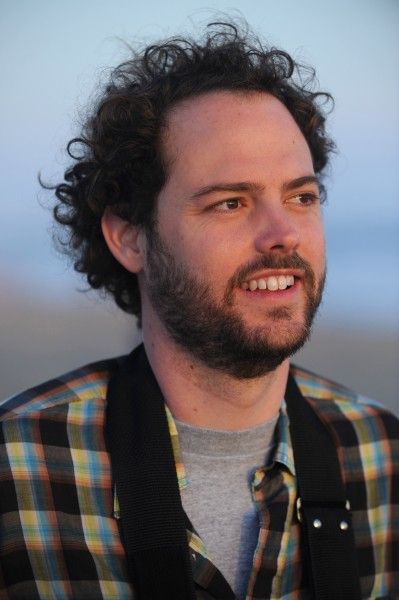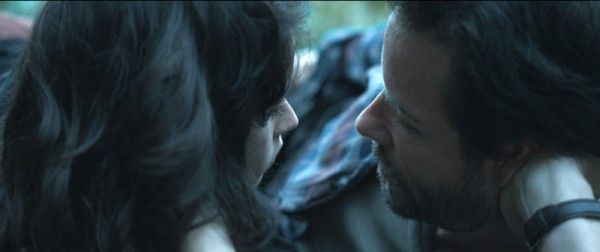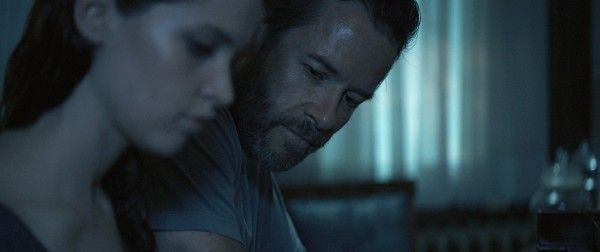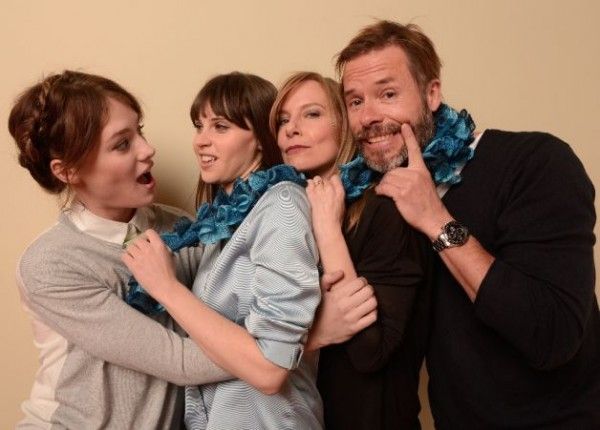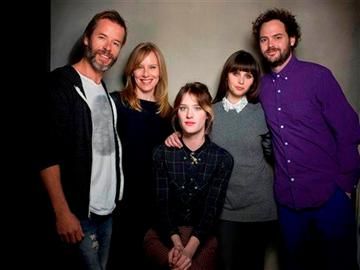I’ve seen quite a few movies at the 2013 Sundance Film Festival over the past week, but one of the few that has stuck with me most is writer/director Drake Doremus’ devastating family drama Breathe In. Doremus made a splash here at Sundance a couple of years ago with the debut of his young love story Like Crazy, and Breathe In marks a major leap forward for the filmmaker in every way. The story centers on a New England couple with a high school senior daughter that decides to take in a foreign exchange student from the U.K. for the semester. As the story progresses, the young girl (Felicity Jones) and the father (Guy Pearce, playing a music teacher) are drawn to each other, creating a rift that builds throughout the film with the kind of tense slow burn that you expect from a well-made thriller. It’s a heartbreaking story with incredible performances (read my full review right here), and it’s definitely one you need to take the time to see once it hits theaters.
A few days ago, I had the chance to sit down with Doremus in Park City for an extended interview about Breathe In. He talked about his goal of making something really different from Like Crazy, his atypical directorial process of having his actors improvise all the dialogue, landing Guy Pearce as his lead, his next project (a futuristic sci-fi romance story), and more. Read on after the jump.
Adam: I just want to start off by saying congratulations, I really loved this movie.
DRAKE DOREMUS: Thanks, man.
Since our readers probably don’t know too much about it yet, I wondering if you could talk about the inception of it and how the scripting process developed?
DOREMUS: I really wanted to try something different. I felt like I had two choices after Like Crazy. One would be just kind of go the mainstream route, which most people really expected me to do, and I kind of wanted to go in the opposite direction. I wanted to try something really restrained and try something much more mature, and I wanted to work with Felicity again so basically the whole story was written for her. I wanted her to play a character that was totally different than Anna as well, so it really started around that. As far as the actual love story itself, it just- in my life thinking about relationships and love and the greatness of it, just wanting to keep exploring that idea.
We know that you like to improvise with your actors, but I was curious as to how drastic the changes can be on set? I know you work on an outline beforehand, but can you talk a little bit about whether there were any big story changes that happened during production?
DOREMUS: Not like big story changes, more like character things. It’s really important to me that the actors bring a lot of elements of the characters to the process so they own it, so it’s personal to them, so it’s not just me saying, “You stand here, you say this, you do this, you feel this.” No, you bring it up from in here and then let’s work with that. So once the outline was done the actors had so much input and we just had so many discussions about developing the characters as far as we could, even if it didn’t end up on screen. Certain scenes would totally change sometimes, we’ll go, “This is the beat of the scene, this is how we’re going to do it,” and then we’ll do it and it doesn’t work at all and we have to completely trash it, re-think it, re-write it and shoot it on a different day or re-work it in the moment. It’s just constantly evolving. That’s a fun way to work.
So you lay out the story beforehand, but there wasn’t any like, “Oh, we should make a giant change here, and what if this happened?”
DOREMUS: Not necessarily, not necessarily actually.
It’s more character based?
DOREMUS: Yeah, the story itself was pretty conceived, it was more just like the execution of how it was conceived totally evolved and changed a lot.
One of the things that surprised me in a good way was that Felicity and Guy are obviously the focus of the conflict in the story, but you really fleshed out the rest of the characters, it’s very, very much a family drama. Was that important to you to have the other characters as fully formed as the leads?
DOREMUS: Yeah, definitely, with the last movie it felt so much like we were just following two people in a bubble and then all the supporting characters were just on the edge of that, whereas with this I wanted to try working with more of an ensemble. So that was definitely a conscious effort, for sure.
You mentioned wanting to move to an ensemble. I really liked Like Crazy, but I feel like this is a huge leap forward in maturity for you. Other than the ensemble idea, was there anything you learned from the Like Crazy process, whether it was making it, post production, or the reception that you wanted to apply here?
DOREMUS: Yeah, I think that I wanted to make a restrained movie. I wanted to make a more epically classic love story as opposed to continuing to explore a teenage, young love kind of vibe. I wanted to try to make my version of Out of Africa. [Laughs] I know that’s kind of a bizarre statement, but something that was very classic in a sense and I wanted to try that avenue essentially.
Music is a major part of the film; do you come from a music family? How did you decide upon that as a big motif for the film?
DOREMUS: Yeah, my grandfather is an amazing jazz bassist and I was always around music growing up. But Dustin O’Halloran really inspired me to take the movie on the music route, to have these characters be musicians. His music just—in listening to it while we were writing they just become musicians because of Dustin. He influenced the tone so much in the writing process and he was involved at the beginning of the writing process, picking the pieces they would play, writing the pieces they would play, the score and all that stuff so he was just like another character in the movie almost.
So your score was written before you guys started filming?
DOREMUS: Some of it was, some of the pieces were. Like the piece in the symphony when they have that look, that was. When they’re at the reservoir together, that little section was. The piece that that she plays for him at the piano when he’s sitting next to her, Dustin wrote that beforehand; we had to do that because she had to play it; so many of the little things like that. But then a lot of it was written after the scenes were done too and custom tailored to the scenes.
That’s interesting because, I don’t know if you saw Cloud Atlas by Tom Tykwer, the Wachowskis said that they’ll never make another movie again without making the score beforehand. Did that kind of help you as you were finding the characters?
DOREMUS: Absolutely. Dustin was such a big part of the movie. I think it just informed a really specific tonality to everything we were doing, and that’s what’s really helpful about it, is you can get a full picture of the moment. This essentially, to me, is in many ways a musical or maybe an opera, so it’s like so much of it informs everything that we really had to be careful and think about it all along the way of the process.
Did Guy and Felicity know how to play piano beforehand? Did they learn it?
DOREMUS: Originally it was the violin and Guy couldn’t quite learn it, he took a couple lessons and it really frustrated him, so we switched it to the cello, which turned out to be much better anyways, it turned out to be a much more physical thing for him, which I loved. But, he took lessons and he understood where the hands go and what the movements were for the songs, but he didn’t actually exactly play it, we had a double. But it was just so incredible that he- I mean, I wanted to shoot wide shots, I wanted it to be real and he was able to do it enough to make it look real; Felicity as well.
You said you wrote the part for Felicity, how did you decide upon Guy? Did you write it for him as well?
DOREMUS: No, she was the beginning of it and then I interviewed like 10 or 15 guys. I had lunch with a lot of different actors, a lot of really exciting actors. But after having coffee with Guy after about 10 minutes I was just like, “this is it.” I’m just a very instinctual person, a very instinctual director and I knew immediately he had it in him, the character I had in mind. It took some convincing though because improvising, let alone in a foreign dialect, was something he’d never done before. I think he was really hesitant about it and it kind of took some convincing on my part that he could learn the instrument and improvise in a foreign dialect. Because of those things and what he does in the movie I just, I’m so grateful to him and proud of him because of all the things he had to overcome to do what he did.
I really think it’s one of his best performances
DOREMUS: Oh, great, man.
Was Felicity kind of showing everybody the ropes because she had been through it before?
DOREMUS: Definitely, I think it took everyone a few days and a lot of coaching from Felicity to just understand that sometimes we’re just going to hit walls and things aren’t going to work, but we’re going to work it out, and arguments are good and arguments are healthy, and were always just working towards the best thing possible. But I think as far as the improvisation itself I think that she definitely set the tone for everybody and that really helped.
I wanted to talk a little bit about Mackenzie Davis because she just comes out of nowhere and she’s really, really fantastic, how did you come about casting her?
DOREMUS: That was by very lucky chance. We had seen so many young actresses in LA and in New York; we had done casting session in both. I want to say my casting director and I went through about 300 young ladies and she was by far the least experienced of anybody that came in. She had never done a movie before, she had just graduated college. So she was just totally fresh and new and didn’t even know what a mark was or anything like that, so it was like she just had this naive nature to her that we needed for Lauren, which was really exciting, that I hadn’t seen from anyone that came in to audition. So I had her come in a couple times and offered her the part.
If I’m not mistaken you shot this in 2011?
DOREMUS: We shot this last summer, summer of 2011. Or no, the fall, like September, then we finished it this last summer and then we waited to bring it to Sundance.
That’s what I was going to ask, was Sundance 2013 always the plan?
DOREMUS: Absolutely, absolutely, I mean it’s tough, there are some great festivals out there between summer and the end of the year, but given my history here and what a special place this is to premiere a movie I just really felt like waiting for six months was the right play.
When you’re in the post-production process, since there’s a lot of improvisation of the dialogue and everything—we know in the comedy world it’s more straightforward like, “this line’s getting laughs, this lines not”—how do you go through all the takes or do you find exactly what you want on the day? Do you film a bunch of different versions of each scene?
DOREMUS: Yeah, there are so many different versions of pieces of things, so the post-production process is simply me watching every piece of footage fresh as if I wasn’t there and then just picking, “That’s honest. That’s honest. That’s honest.” And then I’ve got like six minutes of moments that I feel are honest, and then from those six minutes I just distill it down and down and down and before you know it I end up with a two minute scene. So really, that’s the only rule, is just does that feel honest?
Another thing that struck me about this film is that the cinematography is gorgeous; it’s very tight on the actors so you can get that closeness and intimacy. How did you approach the cinematography this time around? This is the same cinematographer-
DOREMUS: Same cinematographer, yeah, we’ve worked together, we have such great shorthand now. We went to film school together; we’ve been working together for a while. I think we just approached it the way we always approach it, which is how can we interestingly capture this scene in a voyeuristic way that still feels intimate? We’re just trying to push the boundaries, trying to stay away from convention, trying to find how we can narratively tell the story with the camera that feels right. But John [Guleserian] is unbelievable, the way he lights scenes so minimalistically but gets so much elegance out of it is unbelievable. I mean he’s barely using anything, he’s just picking the right time of day to be in the right place with the right shot.
What kind of cameras did you use?
DOREMUS: We used the Alexa.
OK, yeah, because it looked very crisp and you felt like you were in the same room as these characters.
DOREMUS: I think that would be the Hawk V-lite lenses that we used from Germany, there’s only three sets of them. I guess probably the most well-known movie that used them was The Lives of Others and there was just such clarity to them, yeah, like you said they’re just so clean, but they’re so elegant. I mean we love flare and things, but with those lenses you just have to put a shitload of light into those things to flare them because they’re so tight.
It got me wondering, everyone’s using the 4K, like Joseph Kosinski used it on Oblivion and it seems to be popular with these big tentpole movies, would you ever be interested in using that on one of these smaller, intimate pieces?
DOREMUS: I think it would be fascinating.
Yeah.
DOREMUS: Yeah, I think it would be really interesting. Totally, man, that’s a really interesting thought.
Just the clarity brought something even more to the film.
DOREMUS: Yeah, it’s a very specific tone.
Are you one of these guys that has a bunch of scripts and outlines in a drawer and you decide on which one? Or do you take each project one by one?
DOREMUS: I wish. I’m pretty much a movie-to-movie guy. It’s hard for me to multitask so I feel very one-thing-at-a-time oriented and I usually just wait until a movie’s done and it’s premiered, then just kind of reflect on what I’m interested in my own life and let the movies come to me rather than force them.
So have you decided what you’re doing next or are you waiting?
DOREMUS: Pretty much, yeah, I think I’m going to venture into the futuristic, semi sci-fi love story land, but still in my style of improvisation.
How far along is that? Is that in the script stage?
DOREMUS: Just in the idea stage at this point.
That’s really cool. I also wanted to ask about influences on this movie, I know you said you were going for a family drama, but most family dramas come off as melodramatic and sappy. You found a really nice way of telling the story that felt honest and true. Were you looking at any filmmakers or specific works on this?
DOREMUS: Definitely, I have to say A Place in the Sun, the Montgomery Cliff and Elizabeth Taylor film that George Stevens was the filmmaker on, really inspired me. What’s so amazing about that film is that it melded so many different genres. It was a romantically beautiful film, but the romance sort of blossomed in this very dangerous context and that to me was something that I wanted to do with this film.
[BEGIN MINOR SPOILERS] I’ve seen quite a few different responses to how the film wraps up. I felt it was very honest and if you’ve been following this story it’s not too surprising. Did you ever have any other ideas of how to end the film, or was it always pretty solid?
DOREMUS: No, really to be honest I always wanted to bookend it. I always knew that I wanted to show the family in the exact same place doing the exact same activity, but everything in between those two bookends has completely changed that family, but they are still going through the same thing. So nothing’s changed, but everything has and I thought that was such an interesting dynamic to show. So that bookend was always, from the very beginning, in the movie. [END MINOR SPOILERS]
Felicity’s character, going into it I read the synopsis and I was getting ready to hate this girl. It’s a very tough thing to make the audience feel sympathy for this kind of person. How did you approach writing that kind of character? It’s not just a plot device where she drives a wedge through the family; it very much feels like something that’s true to life.
DOREMUS: Yeah, I never wanted her to be a predator by any means, I wanted her to be a character, and wanted him as well, I wanted them to be characters that were fighting the feelings they were having as opposed to giving in to them. I want the audience to feel bad because it’s hard for them, it’s hard and they are fighting and they’re trying not to give into it, but it comes to a certain point where they can’t help it and she’s not an evil person she just let something get the best of her maybe.
I was also struck by how the high school kids don’t come off as—like at the beginning it’s kind of set up as, “oh she’s the popular girl,” but then you quickly realize she feels like a real person and not a stereotype. It’s like you said the grey areas, you’re exploring the grey areas of love, it seems like you’re also exploring the grey areas of high school that aren’t really talked about much in film.
DOREMUS: Absolutely.
I mean, it’s usually the jock, there’s the cheerleader and she’s kind of slutty but she has a heart.
DOREMUS: [Laughs] Yeah, that’s essentially what they kind of boil down to.
So what was your inspiration for crafting those characters?
DOREMUS: I think it was just thinking about my own high school experiences and how grey and weird it is. It’s like one day you’re popular, one day you’re not. One day you’re friends with this person, one day you’re not. One day you’re boyfriend and girlfriend, then it’s kind of grey, then you’re just kind of dating, then he’s seeing this person. It’s this very strange hormonally imbalanced time in your life, it feels like. With those kids I just really wanted it to feel like how I felt when I was in high school.
Is Felicity going to be a part of your futuristic sci-fi romance movie, have you decided yet?
DOREMUS: [Laughs] I don’t know, possibly, she’s really busy and doing great and I’m really excited for her, and hopefully one day in the future we’ll do something else together.
To catch up on all of our 2013 Sundance Film Festival coverage, click here.

